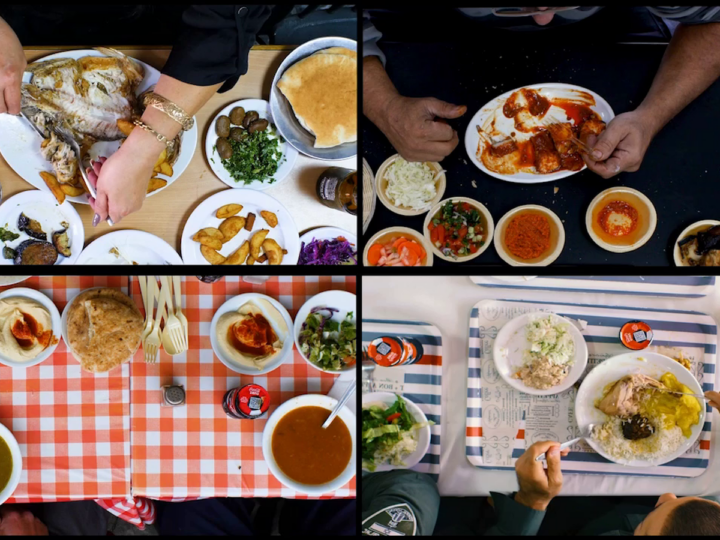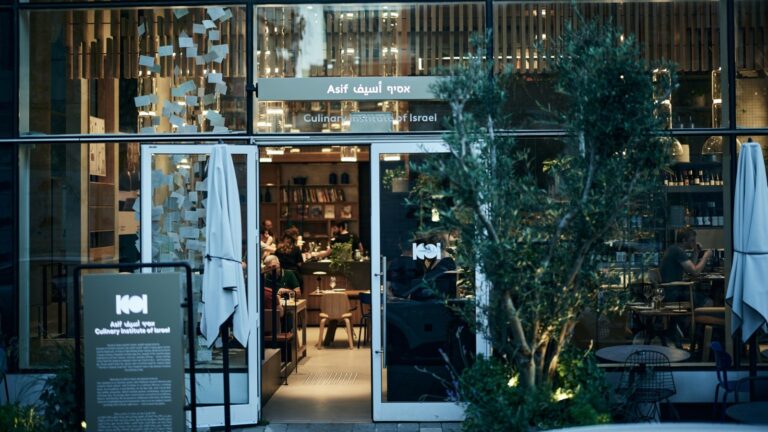Lilienblum Street, in the heart of Tel Aviv, is eerily quiet for a Friday morning. Most stores are closed and there’s little movement of cars or people.
Yet a flurry of activity can be seen through the large glass windows of the Asif Culinary Institute, a foodie magnet for gallery talks, exhibitions, artisanal deli items and its restaurant, which often hosts local and international chef popups.
Today, the street entrance is shut and the only culture on display is a poster announcing a nonexistent exhibition on food advertising.
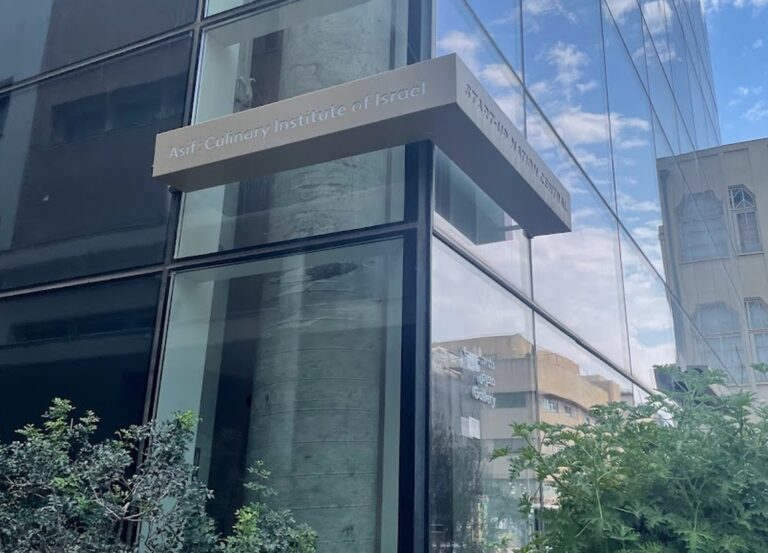
Since just over a week ago, when the country suffered what is now referred to by many as Israel’s 9/11, Asif has been transformed into a war kitchen, producing 2,000 meals a day.
“We responded from the first day of the war as soon as we got information about the urgent need to feed soldiers, the injured in hospitals and displaced families from the south,” Gil Ackerman tells ISRAEL21c between firing off instructions to volunteers.
The owner of event catering company Gilgul Culinary Productions, Ackerman contacted Asif CEO Chico Menashe to organize the joint operation, which is part of a greater effort by dozens of Tel Aviv restaurants.
Ha’Achim, a restaurant on Ibn Gvirol Street, is the logistics hub from where all the meals get dispatched, some as far afield as Eilat.
Even the usually thorny issue of kashrut (Asif does not have kosher certification) was dealt with overnight. The Tel Aviv Rabbinate provided emergency kosher certification and a supervisor comes to Asif daily to assure kosher culinary practices are being adhered to.
What’s the drill?
At midday when ISRAEL21c visited, volunteers were hard at work around long trestle tables packing meals into containers.
Asif Chef Erez Pinchas praises them: “Regular workers usually come in around 10 minutes late. These volunteers even come a few hours early. Everyone knows someone in one way or another that has been affected by the war and they are keen to do their bit.”
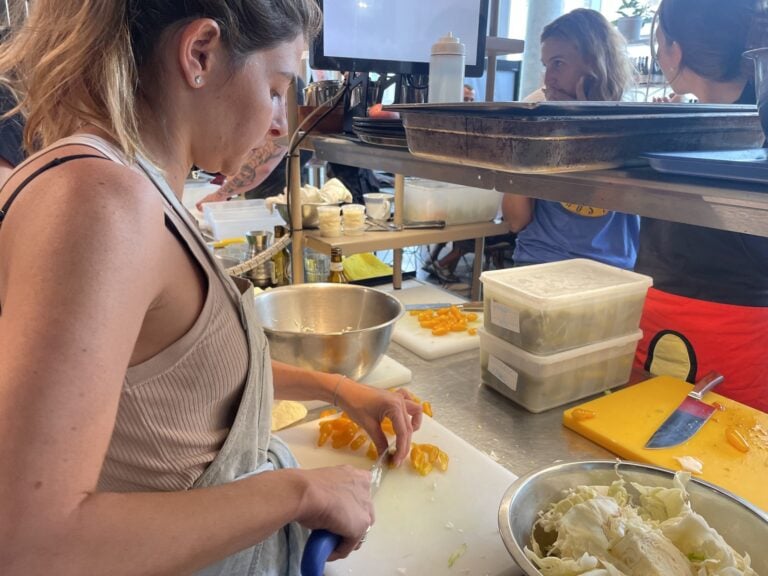
Today the meal sent out will be eaten over the Sabbath. Hamin (a traditional stew that is slow-cooked overnight and incudes meat, beans, potatoes and barley) is the primary dish.
“We make the menu choices not only for physical nourishment but also as comfort food for the soul. We know hamin gives a feeling of home,” says the chef, who ran the Aba restaurant in Cape Cod for over 20 years before coming back to Israel two years ago.
At other times choosing the menu is not that easy as raw materials are often randomly donated.
“Some days we can get 80 kilo of fish and 200 kilo of eggplant and have to plan the menu around that. Also there isn’t only one chef in the kitchen. We have a quite a number volunteering and so there is lots of debate. By 10 at night, when we see what we have for the next day, we will often rewrite the menu at least seven times.”
Another chef volunteering is Tel Avivian Tsila Sipro. She shares that despite 14 years in the restaurant business, she is here to do anything that is needed “from cooking to washing the floors.”

Sipro said she is impressed that despite having 15 chefs in the large, open Asif kitchen at times, they put their egos aside and are just “going with the flow and making it tasty even though it may not be true to their culinary style.”
At one of the other tables, Adi Aloni, who works in marketing for a high-tech company, is dishing up chicken schnitzel, grilled eggplant and a sauce of red pepper aioli.
She admits it’s been easier to volunteer here than stay home and think about what’s going on. “It’s almost like therapy.”
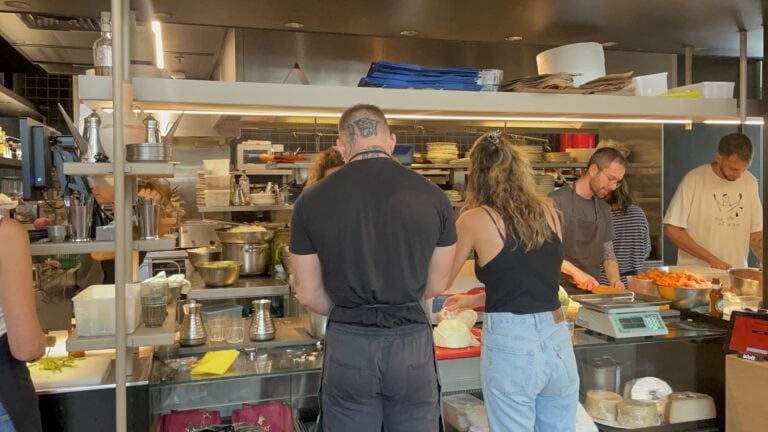
One nation
Asif, the Hebrew word for harvest, was established as a nonprofit joint venture between Tel Aviv’s Start-Up Nation Central and New York City-based Jewish Food Society.
Naama Shefi, who founded the Jewish Food Society in 2017, raised over $30,000 for the emergency Asif kitchen at a fundraiser held at Chelsea Market last week that drew 1,000 attendees.
She believes that what we are witnessing is an “unprecedented civic movement, both in scale and efficiency… Left, right, secular, religious – the people are united, resilient and honestly, are nothing short of astonishing.”
Asif CEO Menashe is also proud also of the response of the nation in these trying times and says it is a true display of Am Yisrael Chai (the Nation of Israel Lives).
“Usually Israelis don’t use this phrase as much as Jews in the diaspora do, but it really is the essence of what we are experiencing. All our people are leaving divisions aside and are uniting.”
Donations to this effort can be sent here.













